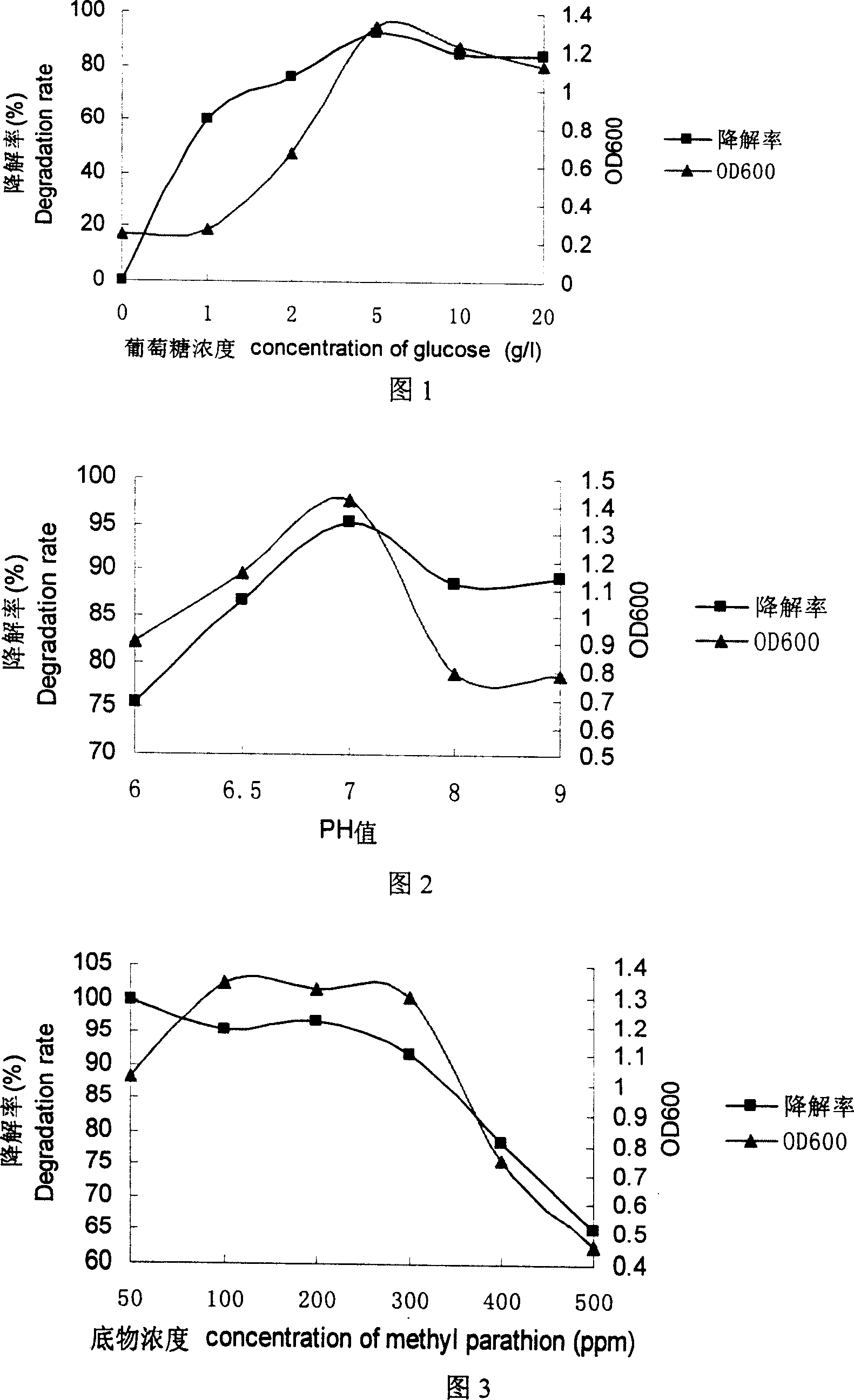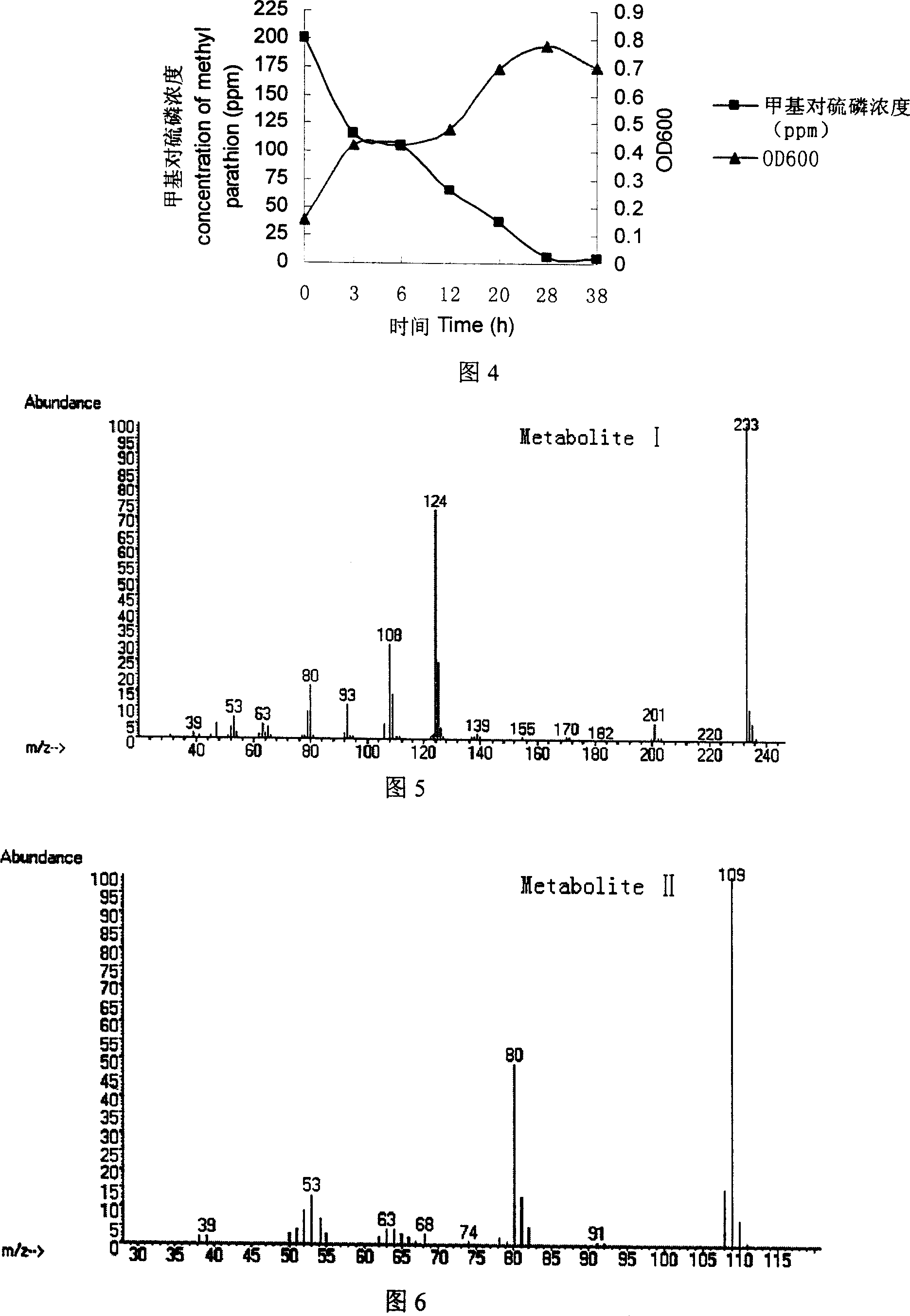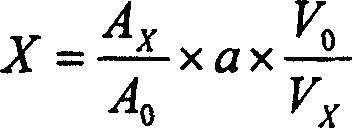DU-E4LP seudomonas putida and use in degradating parathionmethyl
A technology of methyl parathion and degrading bacteria, applied in bacteria and other directions, can solve problems such as health threats, and achieve the effect of large application potential and wide substrate utilization range
- Summary
- Abstract
- Description
- Claims
- Application Information
AI Technical Summary
Problems solved by technology
Method used
Image
Examples
Embodiment 1
[0048] Embodiment 1, separation and screening methyl parathion degrading bacteria of the present invention
[0049] Sampling from the long-term pesticide-contaminated soil collected around Tianjin Pesticide Factory, the collected pesticide-contaminated soil sample is prepared into a 20wt% suspension with inorganic salt culture solution, and then received with 5wt% inoculum containing 50mg / L formazan Shake culture in the inorganic salt culture solution based on parathion; subculture for 6 generations, gradually increase the concentration of methyl parathion in the inorganic salt culture solution to 600ppm; Distribute on inorganic salt solid medium containing 500ppm methyl parathion, culture in a 30°C incubator; select colonies with fast growth (transparent circle on the plate), regular colonies, and stable passage, and purify 2 to 3 times to obtain pure Bacterial strain; The 5 strains that isolate are used as re-screening bacterial strains to expand and cultivate to the same OD...
Embodiment 2
[0060] Embodiment 2, identify the methyl parathion degrading bacteria of embodiment 1
[0061]The bacterial strains obtained in Example 1 were identified by using the computer classification and identification system for microorganisms (Biolog. Inc., USA). Cultivate the purified strain on Biolog medium for 16-24 hours; prepare the bacterial suspension with GN / GP-IF by dry tube method, adjust the turbidity to 52% T; inoculate the bacterial suspension with 150 μl per well on GN-Microplate for identification Incubate the identification plate at 30°C for 16-24 hours; scan the identification plate with Reader, measure the absorbance value of each well, compare the measured results with the database, and automatically give the identification results by the software. The strain was identified as Bacillus subtilis by Biolog technology, and named as methyl parathion degrading bacteria DM-1. The identification results are shown in Table 1.
[0062] Table 1. Identification results of m...
Embodiment 3
[0064] Embodiment 3, the influence of glucose concentration on the growth and degradation rate of methyl parathion degrading bacteria DM-1 of the present invention
[0065] The isolated methyl parathion-degrading bacteria DM-1 bacterial strain in LB medium (same as before) is enlarged and cultivated OD value about 1.5, washes with sterile water after centrifugation, prepares bacterium suspension, with 10% inoculum size is inserted in the inorganic salt culture fluid (the same as before) that contains methyl parathion 200ppm, adds the inorganic salt liquid culture fluid of the glucose of different concentrations respectively (the concentration of glucose is respectively 0g / L, 1g / L L, 2g / L, 5g / L, 10g / L, 20g / L, pH value of 7.0), and with no inoculation as a control, two parallels are set for each sample. 30°C, 180r / min shaker shaking culture for 32h. Get 10ml of culture solution, extract 3 times with equal volume of ethyl acetate, combine three extracts, dry over anhydrous sodiu...
PUM
| Property | Measurement | Unit |
|---|---|---|
| ionization potential | aaaaa | aaaaa |
Abstract
Description
Claims
Application Information
 Login to View More
Login to View More - R&D
- Intellectual Property
- Life Sciences
- Materials
- Tech Scout
- Unparalleled Data Quality
- Higher Quality Content
- 60% Fewer Hallucinations
Browse by: Latest US Patents, China's latest patents, Technical Efficacy Thesaurus, Application Domain, Technology Topic, Popular Technical Reports.
© 2025 PatSnap. All rights reserved.Legal|Privacy policy|Modern Slavery Act Transparency Statement|Sitemap|About US| Contact US: help@patsnap.com



